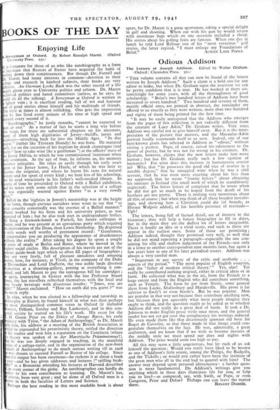COOKS OF THE DAY
Enjoying Life
Jerseyman at Oxford. By Robert Ranulph Marett. (Oxford University Press. iss.)
T is fortunate for those of us who like autobiography as a form f literature that Rectors of Exeter have acquired the habit of riting down their reminiscences. But though Dr. Farrell and r. Marett had many interests in common—devotion to their allege and research in kindred subjects, their books are very ifferent. An Oxonian Looks Back was the sober record of a life gely given over to University politics and reform. Dr. Marett schewed politics and hated committees (unless, as he says, he ould do all the talking). A 7erseyman at Oxford is written in lighter vein ; it is excellent reading, full of wit and humour d of good stories about himself and his multitude of friends. he style at times is almost rollicking. One gets the impression at he has lived every minute of his time at high speed and 'oyed every second of it.
"Autobiography," he justly remarks, "cannot be expected to tart ab ovo." As a matter of fact he starts a long way before stage, for there are substantial chapters on his ancestors, any of them high dignitaries of Jersey—bailiffs, jurats and igneurs—stretching back far into the Middle Ages. " In due ourse " (rather like Tristram Shandy) he was born. He matured rly, for on the occasion of his baptism he drank champagne (and arnt " how to take wine like a gentleman ") at the officers' mess of e Jersey Militia, to which he was commissioned lieutenant when nly seventeen. At the age of four, he informs us, his memory omes articulate. He takes us easily through his early years nt at his Jersey home, La Haule, of which he was later to ome the seigneur, and where he learnt his taste for natural istory and for sport of every kind ; we hear less of his schooling, ut he read voraciously in his father's well-stocked library. In ourse of time he proceeded to Oxford with a Balliol exhibition, d he notes with some relish that in the selection of a college e was especially warned against Exeter " as a very rowdy lace."
Balliol in the 'eighties in Jowett's mastership was at the height f its 'fame, though envious outsiders were wont to say that " to tter conceits conceitedly was the essence of a Balliol manner." larett worked for his firsts and his university prizes, as was xpected of him ; but he also took part in undergraduate frolics. e flung a firework-bomb at Farrell, his future colleague at eter, and he was present at an uproarious party which required e intervention of the Dean, then Lewis Nettleship. He dispersed with words well worthy of permanent record: " Gentlemen, congratulate you on producing the appearance of drunkenness ithout the reality." After taking his degree he spent a couple
f years of study at Berlin and Rome, where he moved in the ighest social circles. His description of his travels are not of the dious guide-book type which so often fill pages of biographies ; ey are very lively, full of pleasant anecdotes and amusing ones, how, for instance, at Tivoli, in the company of the Duke f Devonshire and Lord Dufferin, the two noble lords diverted mselves at a shooting-gallery, potting at everything it con- ned, and left Marett to pay the outrageous bill for cartridges ;
r again, journeying in Greece with the late Professor Stuart ones, the hot travellers refreshed themselves with the local and ery heady beverage with disastrous results : "` Jones, you are ght! " Marett exclaimed. "How on earth did you guess ?" was e meek reply.
In 1891, when he was elected to a fellowship and tutorship in hilosophy at Exeter, he found himself in what was then perhaps e most distinguished common room in Oxford (it included )hater, Pelham, Sanday and Ray Lankester), and in this con- nial society he started on his life's work. His essay for the •• H. Green Prize on the Ethics of Savage Races, his early timacy with Tylor, " the Adam of Anthropology," as Dr. Marett s him, his address at a meeting of the British Association at hich he expounded his preanimistic theory, settled the direction his studies and won him a reputation on the Continent (where s theory was spoken of as der Marettische Prdanimismus!). ut he was too deeply engaged in teaching, in the manifold ties of a college-tutor, and in the organisation of the new-born hool of Anthropology to do much serious writing till in 1928 was chosen to succeed Farnell as Rector of his college. Since :n his output has been enormous—he reckons it at about a book year—and he has given addresses and lectures (" spilling beak- " as a Bostonian attending his lectures at Harvard described in every corner of the globe. An autobiographer can hardly do slice to his own contribution to learning. Dr. Marett's has, course, been very great ; and he alone of all Oxford men is a or in both the faculties of Letters and Science.
Perhaps the best reading in this most readable book is about sport, for Dr. Marett is a great sportsman, taking a special delight in golf and shooting. When out with his gun he would return with enormous bags which on one occasion included a sheep. His stories about his golfing feats are famous. When one day at lunch he told Lord Balfour one of his " most veracious " golf stories, the latter replied, " I must enlarge my Foundations of


































 Previous page
Previous page